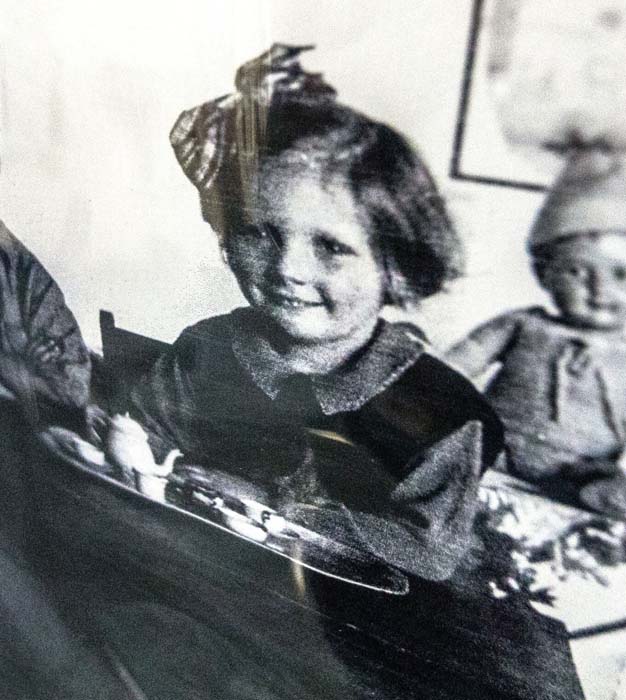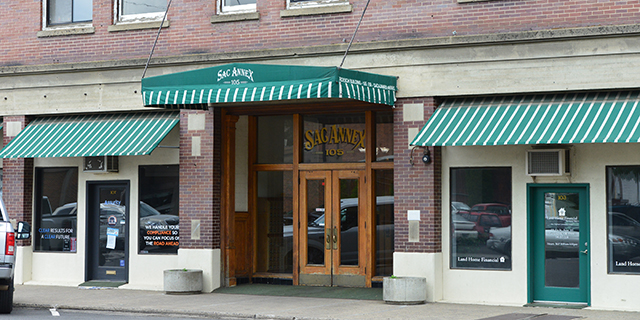Holocaust survivor Anneke Bloomfield speaks at Pendleton Public Library
Published 7:00 pm Thursday, June 2, 2022

- This photo on display Tuesday, May 31, 2022, at the Pendleton Public Library shows Holocaust survivor Anneke Bloomfield as a young girl. Bloomfield was a child from the Netherlands who hid in safe houses to escape Nazis in World War II.
PENDLETON — Anneke Bloomfield was 5 years old in the Netherlands in May 1940 when Nazi Germany invaded her country.
The occupation regime ordered Dutch males aged 16 to 40 to turn themselves in for forced labor. German troops blocked off streets and searched every house. Bloomfield was traumatized when soldiers pounded on their door, demanded entry and searched every room, including hers.
“I was so scared when he came to my bedroom,” Bloomfield said. “I had nightmares for a couple years after that.”
Now 82 years later, Bloomfield, an outreach speaker for the Oregon Jewish Museum and Holocaust Education Center, recounted her young life under the Nazi occupation to a packed house Tuesday, May 31, at the Pendleton Public Library. The presentation was in conjunction with the traveling exhibit “Americans and the Holocaust,” on display at the library until July 1.
Her partner, Jerry Paster, said Bloomfield dedicates her talks on her experiences in World War II to her father, Thomas Siebel. He worked for oil company Royal Dutch Shell. Her mother was a former school teacher.
Avoiding the ‘J’ stamp
Bloomfield was born in The Hague, seat of government of the Netherlands, in April 1935. She said her father saw the threat Nazis posed before the war began in 1939. He made every effort to remove Judaism from his family’s life. They moved from the Jewish quarter of The Hague to a Christian neighborhood, where they bought a three- story house.
They stopped going to temple and instead attended church on Sundays. Her father started working in the church library, so that community members would see him and think he was Christian.
Bloomfield and her siblings were taken out of Jewish day school and put into Christian schools.
“There was a big school open to all just two blocks away,” she said, “but he sent me to a Christian school seven blocks away.”
Bloomfield’s maternal grandparents were rich but stuffy. She adored her father’s poor but loving parents. Even though they lived in Delft, 7 miles distant by road, she visited them on the blue scooter she got from her rich grandparents on her fifth birthday.
“The Netherlands is flat,” Paster observed.
Under the Nazis, everyone 10 and older had to get ID cards. By acting indignant when asked if he were Jewish, her father managed not to get a “J” stamped on his.
Bloomfield had three brothers, Claas, born in 1934, Bert in 1938 and Tom in 1940.
One neighbor was a Dutch collaborator with the occupiers. Their circumstances grew progressively worse. Her dad kept his job for a while. Shell continued to pay him, even though he couldn’t work later in the war. They suffered wartime food and fuel shortages, searches, sweeps and roundups by German soldiers.
Family sends her away
Shortages worsened. Bloomfield’s father made her shoes from wooden planks in the attic floor.
Bloomfield said her family sent her three times to live with strangers. Her parents feared the situation in The Hague had become too dangerous for her and her siblings to stay there. They might be outed as Jews at any time.
Her older brother was sent away first. Her parents didn’t tell their children the real reason why they were being sent to the country. They said it was for lack of food.
“Imagine how little kids would feel,” Paster said. “What did we do wrong? Don’t you love us?”
The first time, Bloomfield went south to near the Belgian border, to stay with a couple without children. When it became riskier to hide children, they returned her home.
“In Eastern Europe, the Nazis killed people who hid children,” Bloomfield said. “In the Netherlands, the penalty wasn’t always death, but the consequences were severe.”
Her family decided to send her away again, this time to a farm up north. There she stayed with a family that took good care of her. They had a daughter about her age. Bloomfield had never tasted pork, but loved it. The rich food made the starved little girl sick, so she was once again sent home.
On the beach where her family used to vacation, she said she saw launch pads for V-1 cruise missiles, which rained down upon England.
A V-2 ballistic missile launch site was set up in the Hague. About two-thirds failed to head for England. An errant missile missed her school but hit a boys’ orphanage next to it. She said she had obeyed her father’s instructions to observe a launch and note if the missile were headed in the right direction or not. He found places for her to shelter on her walk to school.
Her father was in the Dutch Resistance. People could enter a library without suspicion, so he became a conduit of information for the Underground. At 8, Bloomfield said she carried two “newspapers” — filing cards with intelligence, to contacts after dark, but before the 8 p.m. curfew.
If out after then, she’d be shot.
She saw two men try to evade detention by German soldiers beneath an underpass.
“It didn’t work,” she said. “They got pushed up on the wall, and they got shot.”
Bloomfield made it home without being caught, but she was too scared to work as a courier anymore. Her father decided she was no longer safe in The Hague.
Leaving a third time
Her mother gave her coat and a flannel sheet to make warm clothing for her daughter. Her father acquired used shoes with the toes cut out.
The third time Bloomfield was sent away, she said she went north again to Heerenveen on a bus full of other children, and a man she knew. The bus was bombed. The man was bleeding from his ear. Her new coat was torn in many places, but she didn’t get a scratch. She and another girl ran from the bus. They were let into the third house they approached and waited until it was safe again.
When she returned to the bus, only seven children remained, but they resumed their journey. By the time Bloomfield arrived at her new refuge, she had lice and was hungry. Food and fuel were scarce. In the mornings she would go to the soup kitchen for food and warmth. There was no way for her to contact anyone she knew, so she continued to live in fear and hunger.
“For a year, from 9 to 10, I didn’t grow an inch,” Bloomfield said.
Hitler was punishing the Netherlands for its support of the Allies after their liberation of part of the Netherlands in September 1944. She witnessed the Germans evacuating the Netherlands in 1945. First the officers, then truckloads of infantry in trucks, fled east.
The British Army liberated Heerenveen, but it didn’t have enough food to share. Neither did the Canadians, who followed. Bloomfield foraged for food. If she found a turnip or potato, she dusted it off and ate it raw.
Finally, the Americans arrived and took pity on a lousy, scrawny girl with frightful hair, a coat shot full of holes and her toes sticking out. They dusted her hair with insecticide DDT and told her not to wash it for three days.
“The bread with butter was the best cake I ever had,” she said.
One day, she was told to report to a truck. There she met her youngest brother, now 5, who, unbeknownst to her, had also been sent north. They returned home together.
Nothing the same after liberation
Back with her family, Bloomfield asked where her toys had gone, including her scooter. Her parents explained she now had a baby sister, Henny, but her starved mother couldn’t make milk, so they had farmed the infant out. The family which agreed to take her demanded all Bloomfield’s toys.
“It took Anneke three years to reestablish a relationship with her father,” Paster said. “They took long walks together, but she was never able to bond with her mother.”
Bloomfield said that she wasn’t able to eat normally until she was 31.
Her older brother was the most damaged, she said. He kept running away to the farm family that had fostered him. Then, at 18, he left for Alberta, finding work as a truck driver in Calgary.
When she turned 20, Bloomfield also went to Canada. She was able to track Claas down. Against her father’s wishes, she stayed in Canada, married a Swede, adopted a son and moved to Phoenix, Arizona, with her family.
Paster said when Bloomfield went to Canada, she spoke Dutch, German and French, but had just started learning English. It would take her 10 years to make up for lost schooling.
She relocated 19 years later to North Hollywood, California. Her husband died. She eventually retired to the Portland area.
“Some people claim you can’t be a Holocaust survivor without having been in the concentration camps,” Paster said. “But those who escaped capture suffered as well.”









